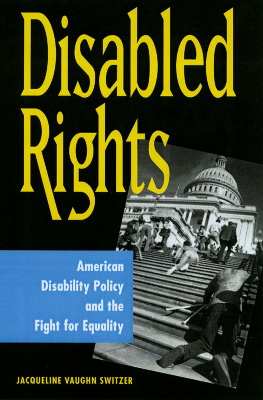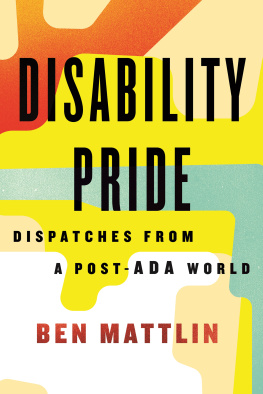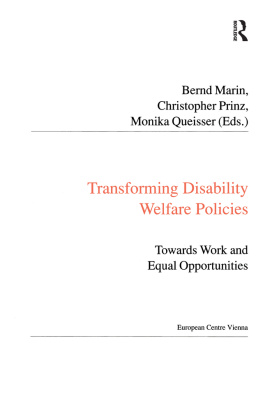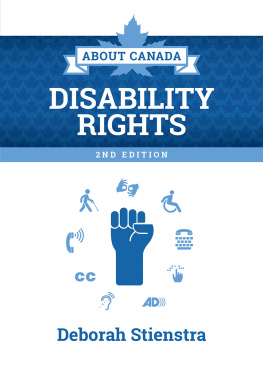Georgetown University Press, Washington, D.C.
2003 by Georgetown University Press. All rights reserved.
Printed in the United States of America
This volume is printed on acid-free offset book paper.
Library of Congress Cataloging-in-Publication Data
Switzer, Jacqueline Vaughn.
Disabled rights : American disability policy and the fight for equality / Jacqueline Vaughn Switzer.
p. cm.
Includes bibliographical references.
ISBN 0-87840-897-5 (hardcover : alk paper) ISBN 0-87840-898-3 (pbk. : alk. paper)
1. People with disabilitiesGovernment policyUnited States. 2. People with disabilitiesCivil rightsUnited States. 3. People with disabilitiesLegal status, laws, etc.United States. I. Title.
HV1553 .S95 2003
Acknowledgments
M uch of my interest in disability policy stems from the influence of my mother, Ruby Vaughn, who contracted polio as a child, and from my Ph.D. dissertation advisor at the University of California, Berkeley, Sandy Muir, who used braces and eventually a wheelchair. In the mid-1990s, I faced disability head-on because of my own experiences and those of my colleagues at Southern Oregon State University, several of whom unexpectedly joined the ranks of the disabled after incidents involving environmental illness. I am especially indebted to Dr. Claude Curran, who supported my efforts to bring attention to compliance with the Americans with Disabilities Act (ADA) there. At Northern Arizona University, I received two years of research support for my study of implementation of the ADA, which enabled me to do field interviews that further expanded my knowledge of disabilities and policies designed to assist people with disabilities. Dr. Edward Berkowitz of George Washington University offered initial guidance on the conceptual framework of the manuscript, as did several other reviewers. I wish also to thank Christopher Kelaher of Brookings Institution Press, who saw the potential for the book and encouraged me to continue my initial research, and Gail Grella at Georgetown University Press. She once remarked to me that this is a story that needs to be told.
Last, I offer my gratitude to the academicians, researchers, legislators, and thousands of activists who have championed disability issues. They have framed disability policy as a subject of both political and social significancea civil rights issue as important as any other our nation has encountered. As disability activists tend to put it, Its the only minority group that anyone can join.
Introduction
T he twenty-first century began with a series of contrasting events that illustrate both the salience of issues involving persons with disabilities and the continuing saga of discrimination that affects untold millions of Americans.
In March 2000, the Sixth District Court of Appeals overturned on a technicality the misdemeanor conviction of Kelly Dillery, who had been arrested in Sandusky, Ohio, in 1998 on a charge of being a pedestrian in a roadway. Dillery, who uses a motorized wheelchair because she has muscular dystrophy, used her wheelchair in the citys street because she said the sidewalks were raised or broken and therefore were inaccessible to her. She was charged four times in less than a year for her actionsonce for child endangering because she carried her daughter on her lap (a first-degree misdemeanor for which she was later acquitted). During interviews, Dillery indicated that her daughter had learned to assist herjumping off the wheelchair to pull her mother out of potholes in Sanduskys roadways.
The Dillery case became a cause celebre for disability rights activists. One advocacy specialist called her our Rosa Parks (referring to the black woman who symbolized the civil rights movement). In a rally outside Sanduskys City Hall, protestors braved near-freezing temperatures to shout, Access is a civil right. Her cause is all our cause, said one Ohio supporter.
In May 2000, actor Clint Eastwood faced a showdown that was a far cry from the battles that characterize his film and television career. The former Eastwoods testimony was a response to a lawsuit filed against him in 1997 by Diane zum Brunnen. The plaintiff alleged that when she and her husband visited the actors Mission Ranch Inn resort, at least one bathroom and the hotel parking lot did not comply with the ADA, and there were not enough rooms that were accessible to disabled guests.
Eastwood denied that the hotel was not accessible and claimed that he was being preyed upon by money-seeking attorneys who were going after small businesses. Disability advocacy groups, such as the Paralyzed Veterans of America, supported the lawsuit and told reporters that the proposed amendment ignores the fact that owners of properties... have had almost ten years to comply with the law. The amendment also was opposed by the Clinton administration, which issued a statement saying the proposal would work to undermine voluntary compliance with the Americans with Disabilities Act and... unduly burden legitimate ADA enforcement activity.
Perhaps the most poignant comment was made by the plaintiffs attorney, Paul L. Rein. If a black person is not allowed to enter a business because of his race, hes not required to send a letter. If a woman is not allowed to...shes not required to send a letter. Why should disabled persons be the only class of persons required to send letters?
In October 2000, the U.S. Supreme Court heard oral arguments in one of the most important civil rights cases of the new millennium, University of Alabama at Birmingham Board of Trustees, et al. v. Patricia Garrett.breast cancer in 1994. She took four months of leave from work, but when she returned she was demoted and received a significantly lower salary. She filed a federal lawsuit against her employer, arguing, in part, that the university had discriminated against her while she was undergoing treatment, repeatedly threatening to transfer her or permanently replace her. She claimed that the ADA protected her against the universitys actions, stating that her rights were violated when she was demoted after taking sick leave.
In federal district court, the case was consolidated with a similar case, Ash v. Alabama Department of Youth Services. The judge dismissed both cases on summary judgment on the grounds that the Eleventh Amendment to the U.S. Constitution grants sovereign immunity to states. The ruling had the effect of declaring that states were immune from the ADA, voiding the discrimination protections granted to disabled persons since 1990. The U.S. Supreme Court granted certiorari in April 2000, providing an opportunity for a critical ruling on the constitutionality of the law. The case and the Supreme Courts ruling are described in detail in the epilogue.
These events epitomize the crux of the struggle of Americas largest group of citizens who are denied their basic civil rightsthe more than 50 million persons in the United States with disabilities. The disability community has slowly come together in the past half-century to bring forward its demands. As with other social movements, the struggle for civil rights has meant destruction of stereotypes, attempts to capture political support, and building of coalitions among subgroups with different needs and social agendas.










